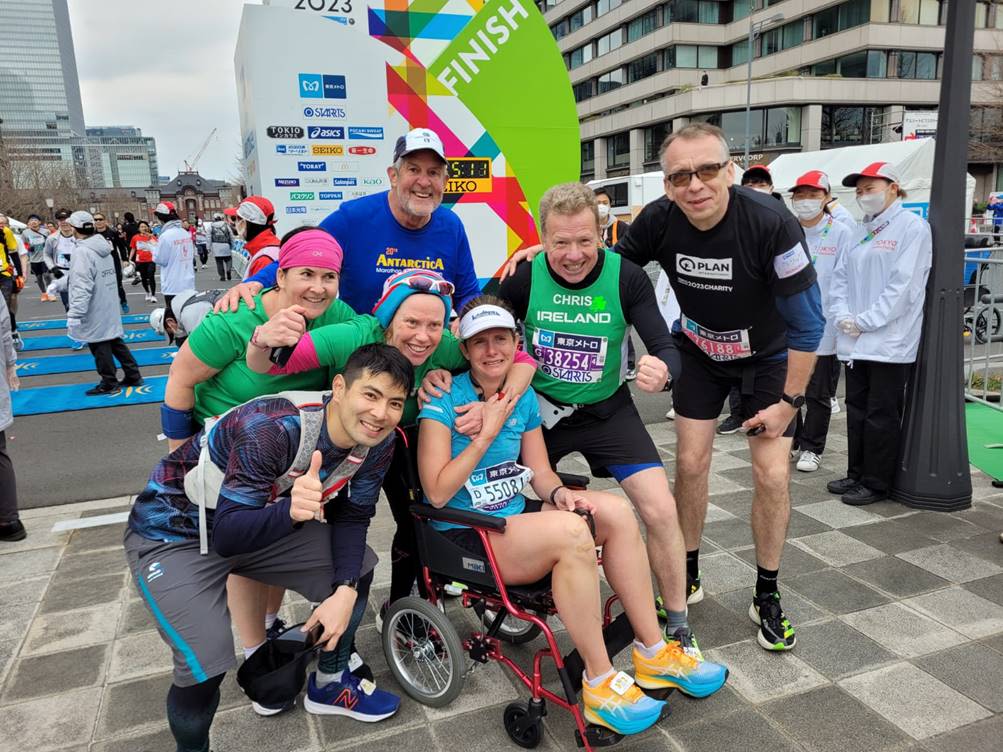
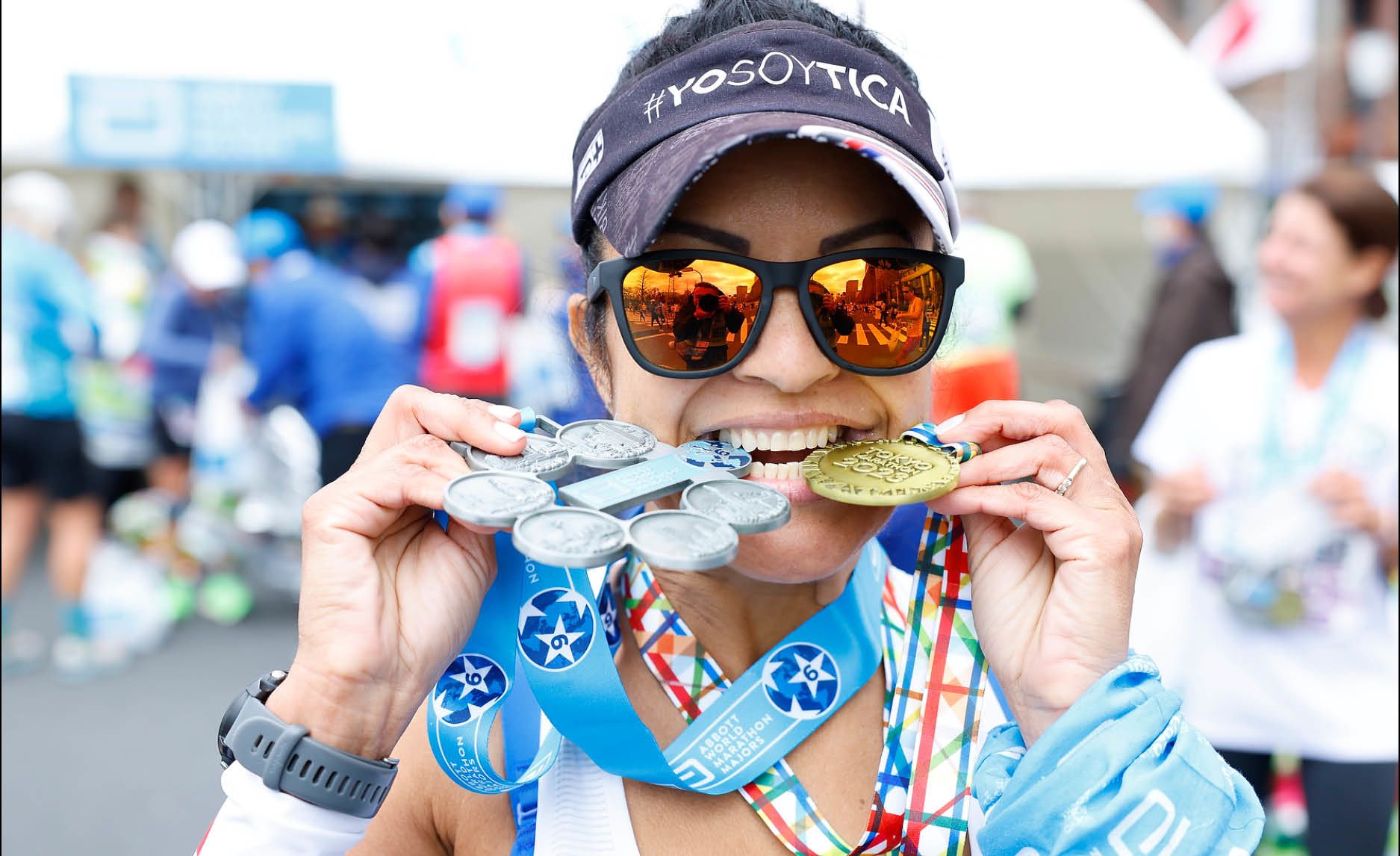
On March 5, 2023, Judee Kakos woke in her room at four in the morning with a knot in her stomach.
Downstairs, the cavernous lobby of the Keio Plaza hotel would soon be humming with anticipation.
Runners from all over the world began amassing in the foyer, making last-minute preparations and checking the rules about what they could and couldn’t take into their start corrals one more time.
The day of the Tokyo Marathon had dawned. It was a day more than 3,000 people had been anticipating for the best part of four years. Almost 10 per cent of the entire field were due to become Six Star Finishers.
The Six Star program had always seen high numbers in Tokyo. In 2019, 732 runners were awarded their Six Star Medal in the Japanese capital.
Then came the COVID-19 pandemic and a hiatus for travel to Japan lasting from the onset of the virus in early 2020 until restrictions eased in late 2022.
Effectively, three Tokyo Marathon cycles had been missed. There was an elite only race in 2020, no race at all in 2021 and a race for elite athletes and domestic residents only in 2022.
While travel to the other Majors cities had recommenced and small numbers of Six Star Medals were given out in Boston, London, Berlin, Chicago and New York in 2021 and 2022, the Tokyo backlog began to swell. And swell.
All that pent up demand for a Six Star Medal in Tokyo had been concertinaed into one edition.
It meant the Six Star Medal handout operation was going to be like nothing Judee and the Majors team had seen. She’d been working as AbbottWMM’s director of customer service for several years, but nothing like this had ever happened before.
“I was terrified,” she says. “I knew we had a huge day ahead of us and I wanted it all to be perfect. This is round eight of working at the races for me and this one by far exceeded any feelings of terror, nervousness and anxiety I’d had in the past.”
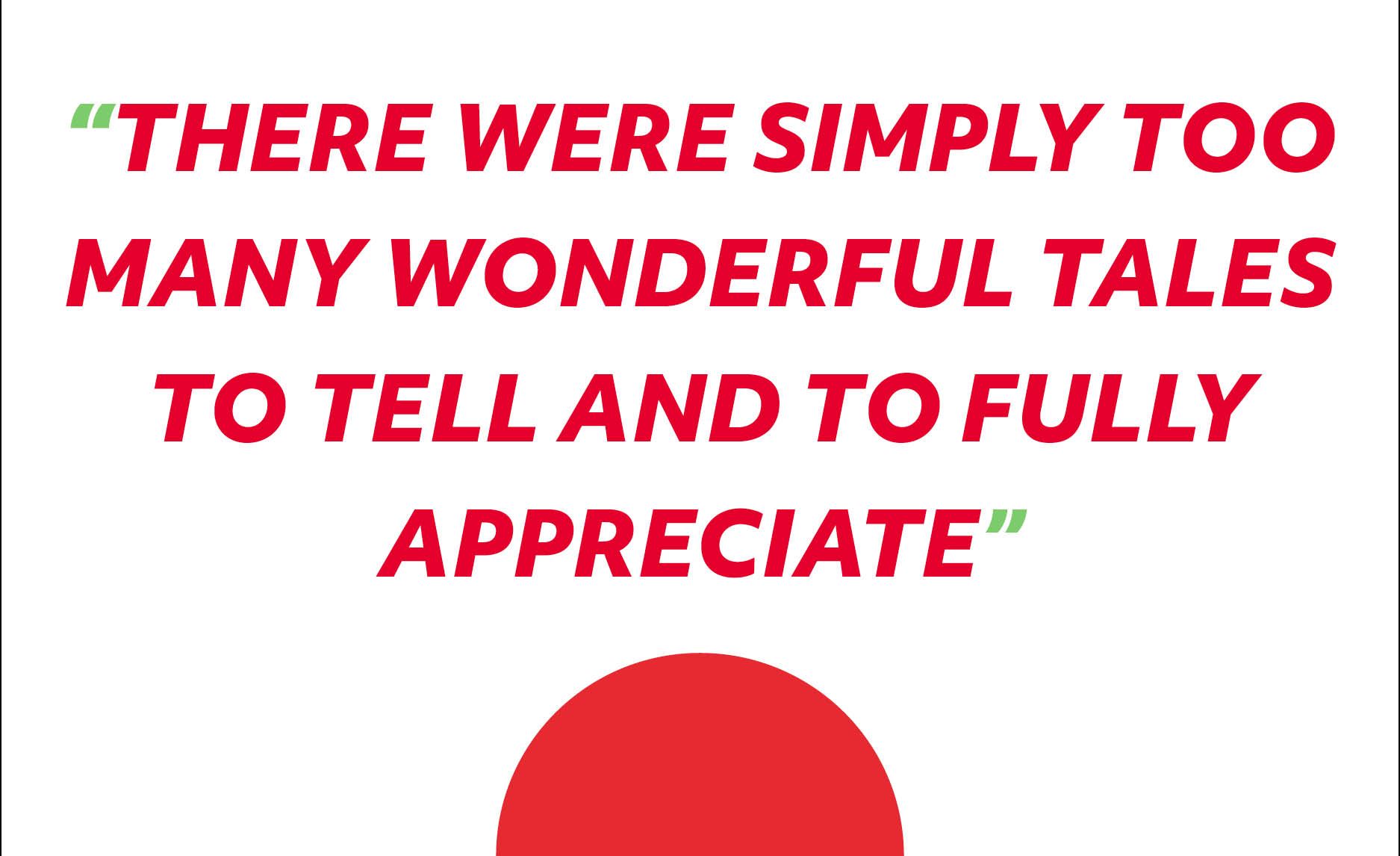
THE NUMBERS MAN
Good teams operate best with a balance in approaches when it comes to solving problems. Equalizing Judee’s concerns at the sheer scale of what lay in store was the team’s super-computer in human form.
Stewart Haynes crunches numbers like an escapologist exiting a straight-jacket in a tank of water. Panic is not a factor.
He’s the team's Head of Results and Rankings, which means he sees more than 300 sets of race results come across his desk in a single year. You can’t do Stew’s job and not love numbers.
In 2021 he oversaw a project to build a console for Six Star Hopefuls to register with AbbottWMM in order for the team to more easily tally up how many runners were due to receive their medal at each Major. As Tokyo drew closer, that tool was put thoroughly through its paces.
He and Judee watched from summer 2022 as the number of Tokyo Hopefuls climbed ever higher. Each week on team meeting calls, figures were tossed around as to where the total might end. No one predicted 3,000. At least not until early 2023.
Options for how the team would cope with these unforeseen numbers began to be discussed. At every race since the Six Star program began, medals had been awarded close to the finish line, exhausted runners already bedecked in their race medal trudging down the finish chute to the Six Star tent to receive their coveted piece of hardware.
As March 5 drew closer, it was debatable whether that was even going to be practical given the numbers piling up.
“We considered an off-site location but the logistics of having everyone come to one place – that would have to be much further away – were going to be problematic,” says Stewart.
“We decided the finish line would be a better experience for runners. We have had two tents – one either side of the finish – in recent years in Tokyo, and we knew this would be an option again, but the sheer volume needed further work to understand how we’d get through them without causing a major backlog.
“We employed Marcel Altenburg, a crowd science expert, to consider flows of runners and how many would need to be processed every five minutes to avoid substantial queues. This then lead us to the number of photographers and backdrops required to get runners their special medal photos without taking too long.
“Based on a runner’s predicted finish time and historical start data, we were also able to determine the number of runners arriving at our tents in five-minute intervals.
“This made us aware of the peak 35-minute window when we knew we would be under the most pressure.”
Eventually, it was settled. Two tents, four photographers and backdrops at each location and roughly an even split of 1,500 runners to arrive at each one.
Judee and Stewart would run one medal tent each with the help of AbbottWMM team members Lorna Campbell and Scott Cassin, plus a small army of volunteers provided by series title sponsor Abbott.
As the team’s communications guru, Lorna had been hearing stories for months from around the world of people who had been waiting for this moment.
“There were firsts for Six Star Finishers from Egypt and Pakistan, our first deaf-born runner Thomas, those going round the series again, couples, families, Bill Bucklew who’s run all six as a Parkinson’s sufferer. I’d known him for years and would finally get to meet him in person at the finish line! There were simply too many wonderful tales to tell and to fully appreciate.”
What Lorna also had up her sleeve was a wealth of experienced local contacts, having run the media operations for the tennis center in Tokyo during the Olympic Games.
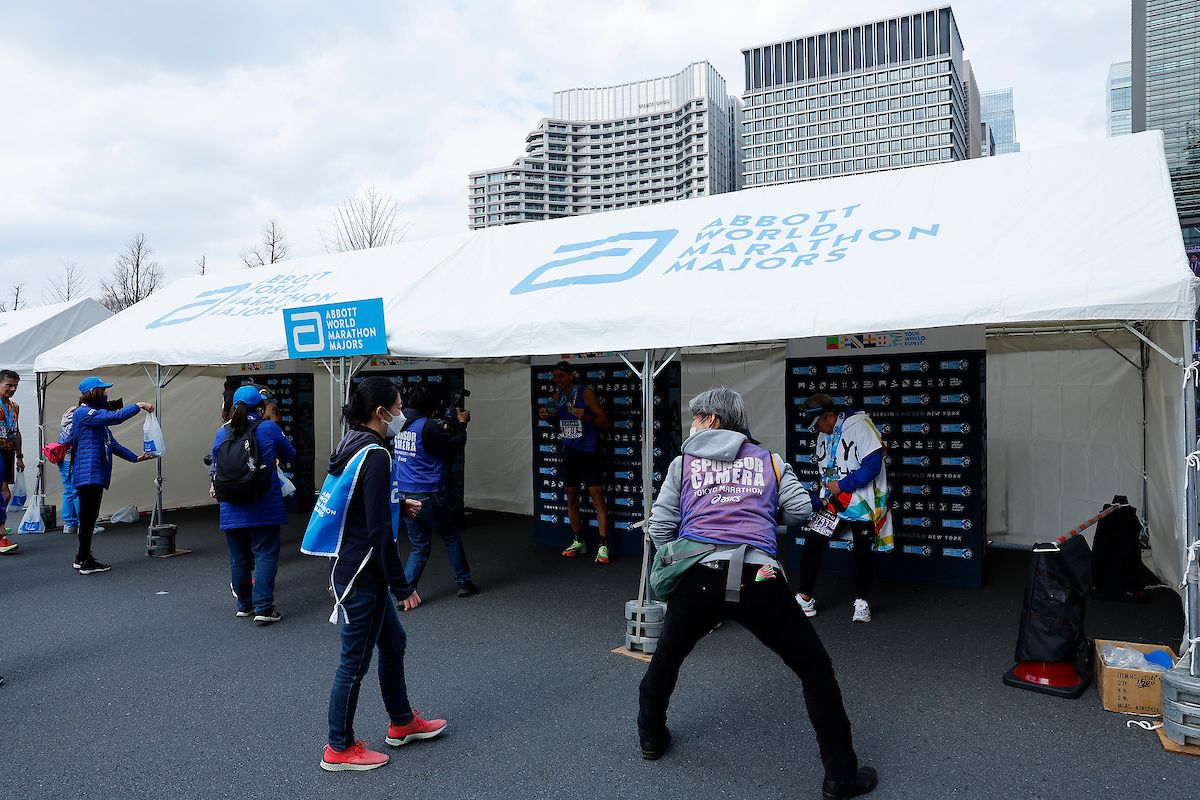
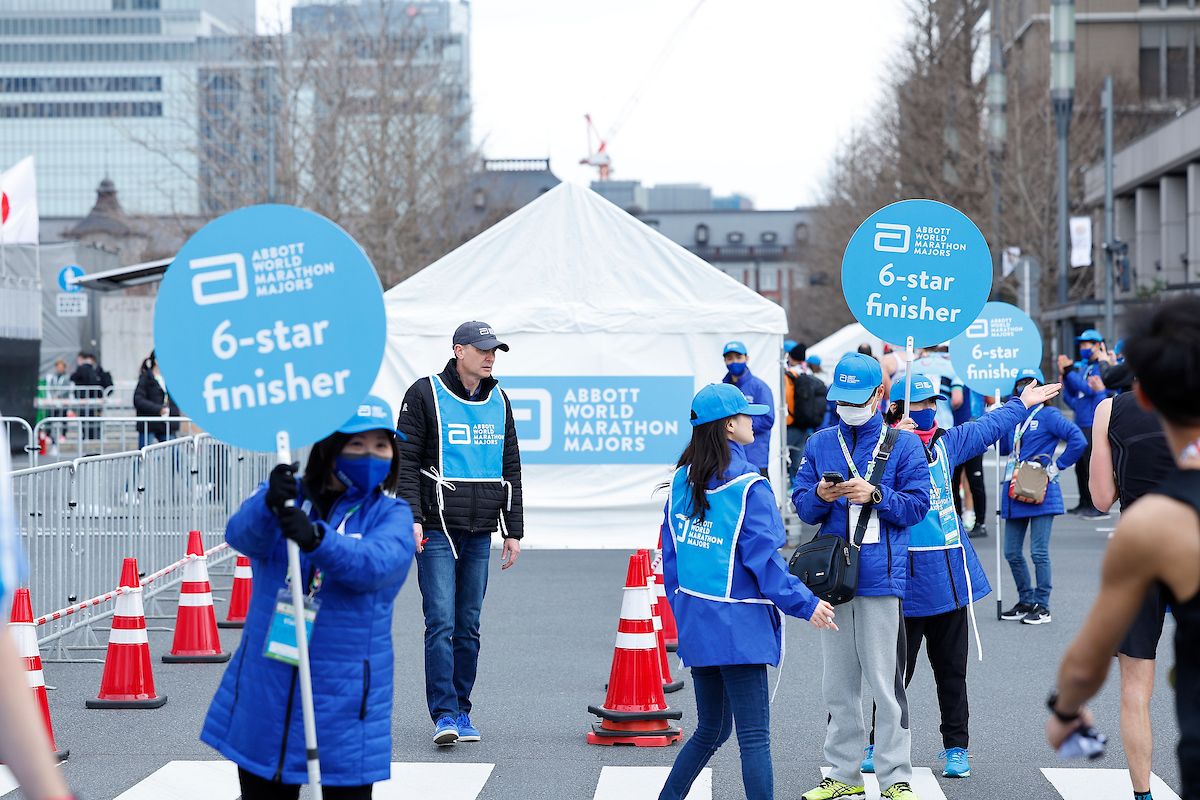
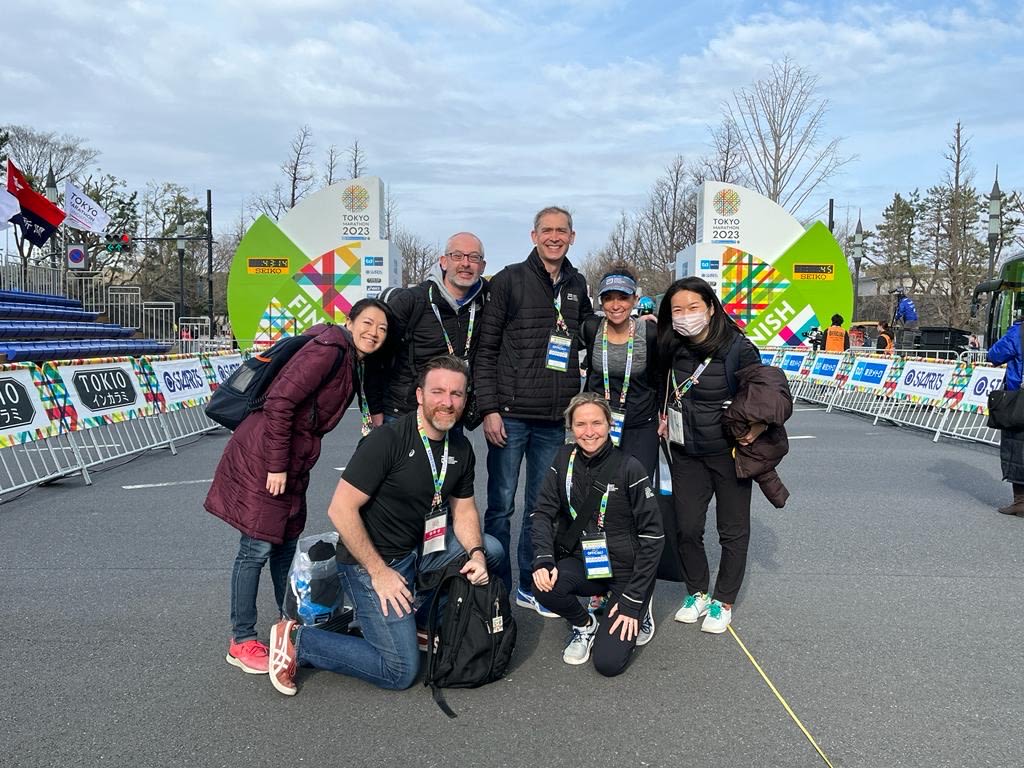
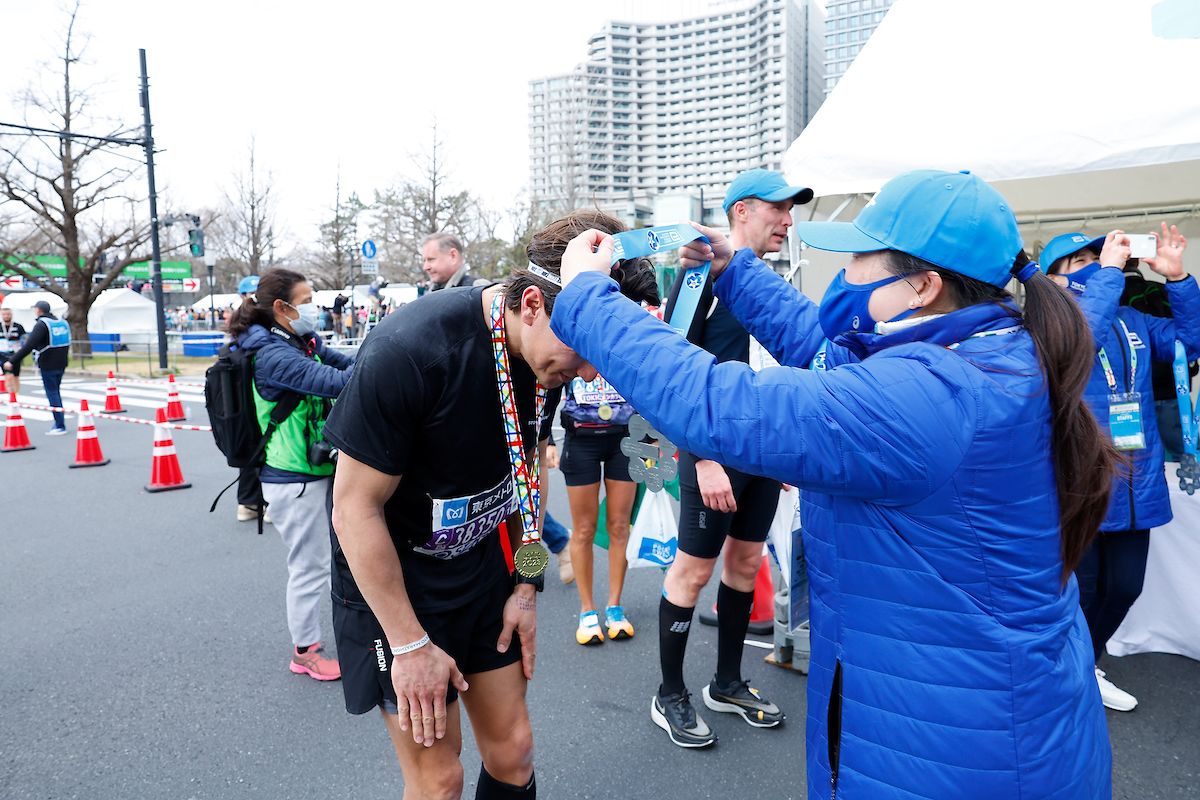




“I was able to recruit my friend Asuka, who worked as my deputy venue media manager for tennis at the Games. I knew she was reliable, able to assist in a range of tasks and her English skills are beyond impressive. Asuka then roped in her friend Ryoko who also worked at the Olympics. She was wonderful.”
The team assembled in the packed lobby and boarded their transport to the finish. There was a cool, stiff breeze in the morning air and the home straight was undergoing its final preparations as they arrived.
Men in hard hats were buzzing around to the soundtrack of clanging crowd barriers being moved into their final positions and a PA system blaring out sweeping, celebratory anthems.
After an obligatory team photo in front of the finish, Judee and Lorna headed off to one side of the street, Stew and Scott – AbbottWMM’s Head of Global Partnerships – to the other, and they began the lengthy job of unboxing the 3,000 medals they would be handing out.
Scott had rolled up his sleeves earlier in the week serving thousands of Six Star Hopefuls at the race expo as they came to collect their Guinness World Record Medals. The race would set an official world record for Six Star Finishers at a single marathon, and Scott had just about met them all in the three days before the race. Now he was busy getting their Six Star medals ready for them.
“Unpacking 1,500 individually wrapped medals was a killer! My knuckles have still not recovered from the repetitive motion for three hours. We set up the photo backdrops, the medals, and then briefed the volunteers.”
All that was left to do was wait. The elite races would be done by just after 11am and the arrival of the fastest Six Star Finishers would begin around 10 to 20 minutes later.
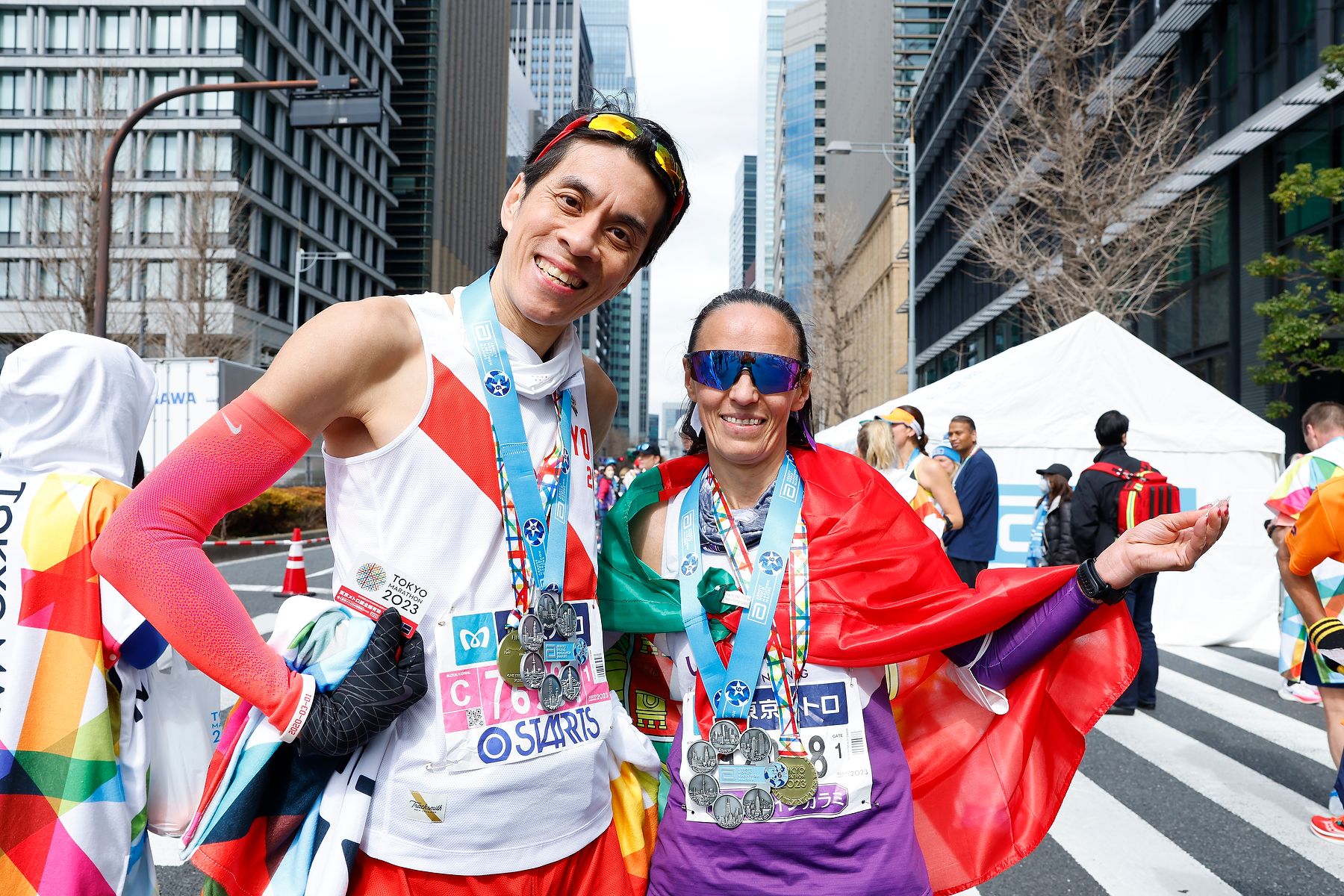
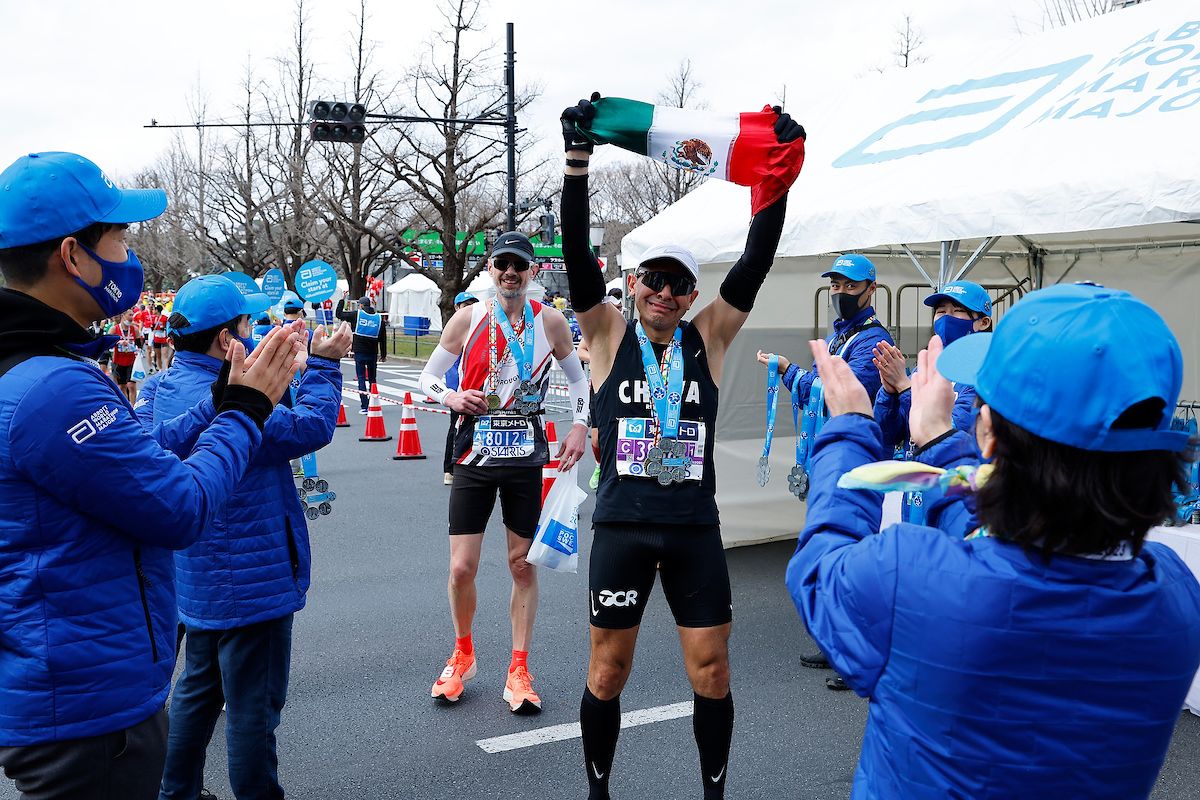
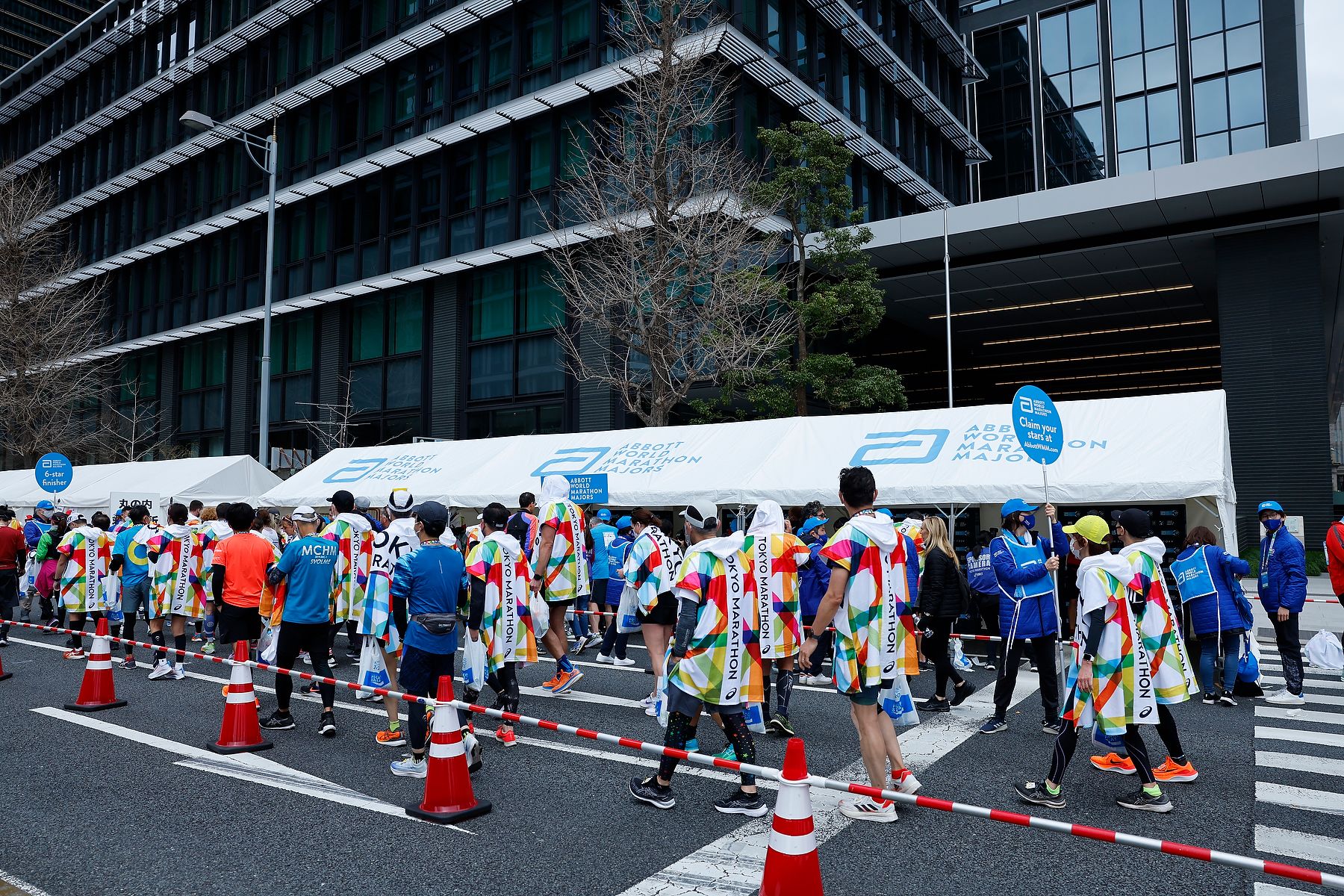
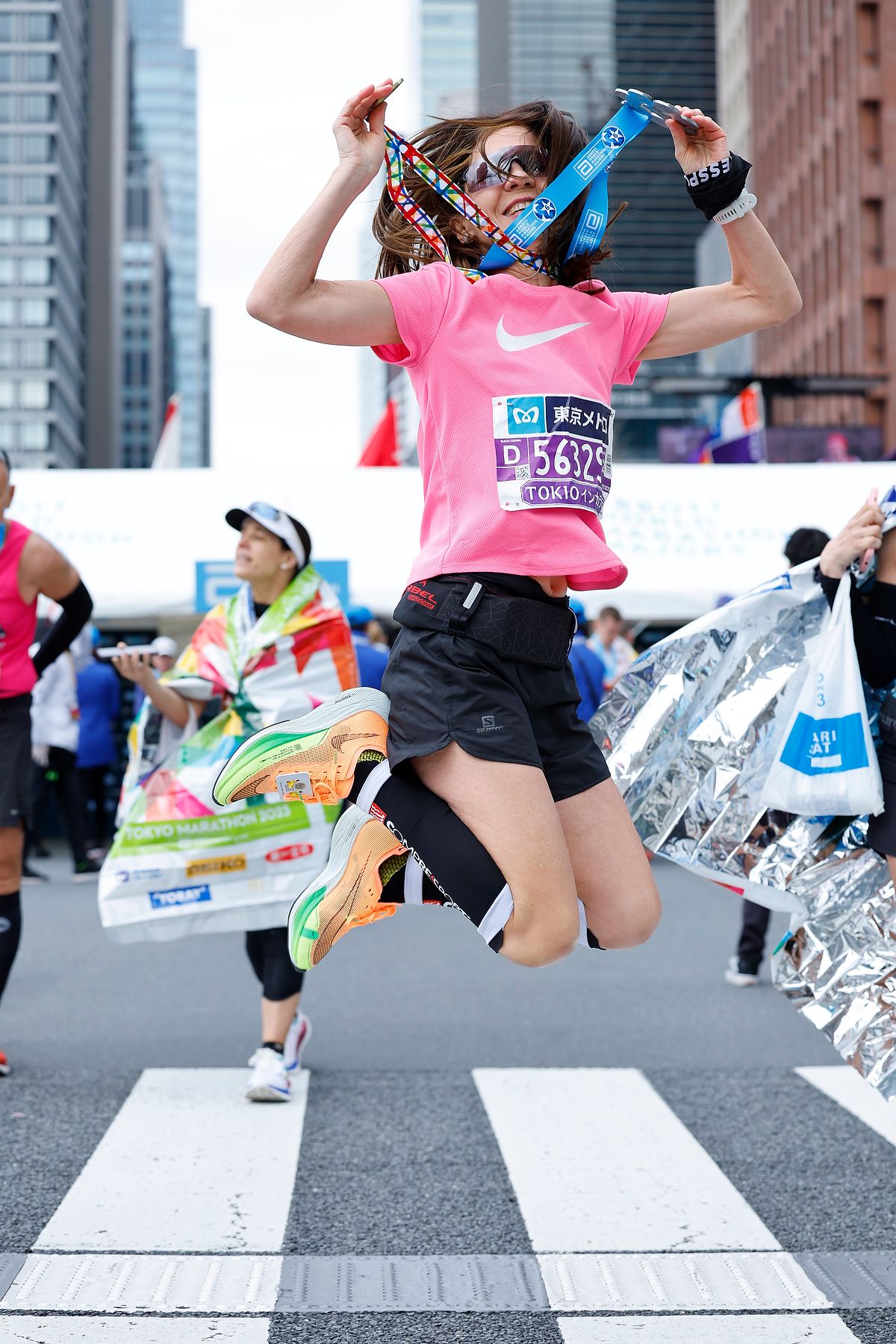
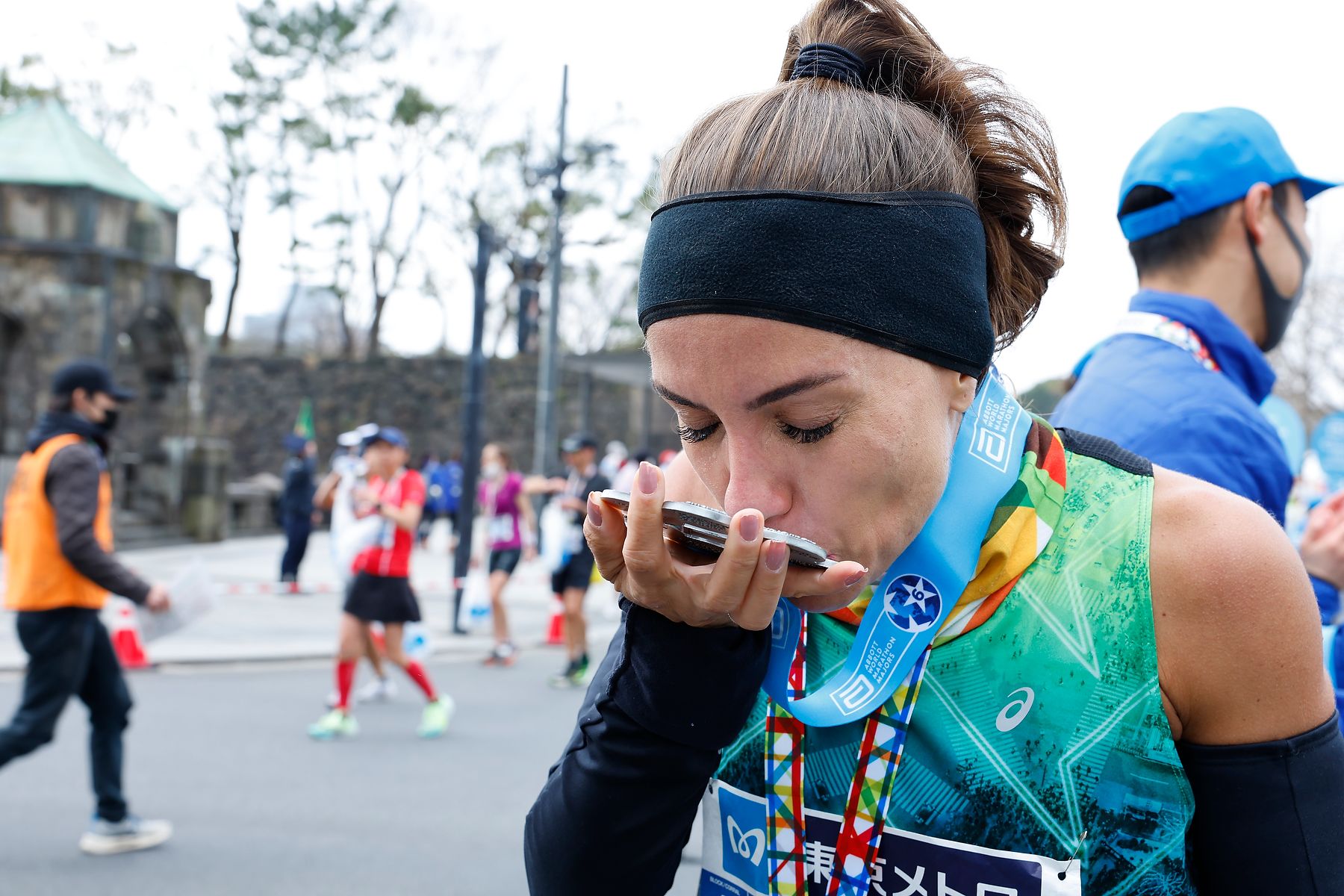
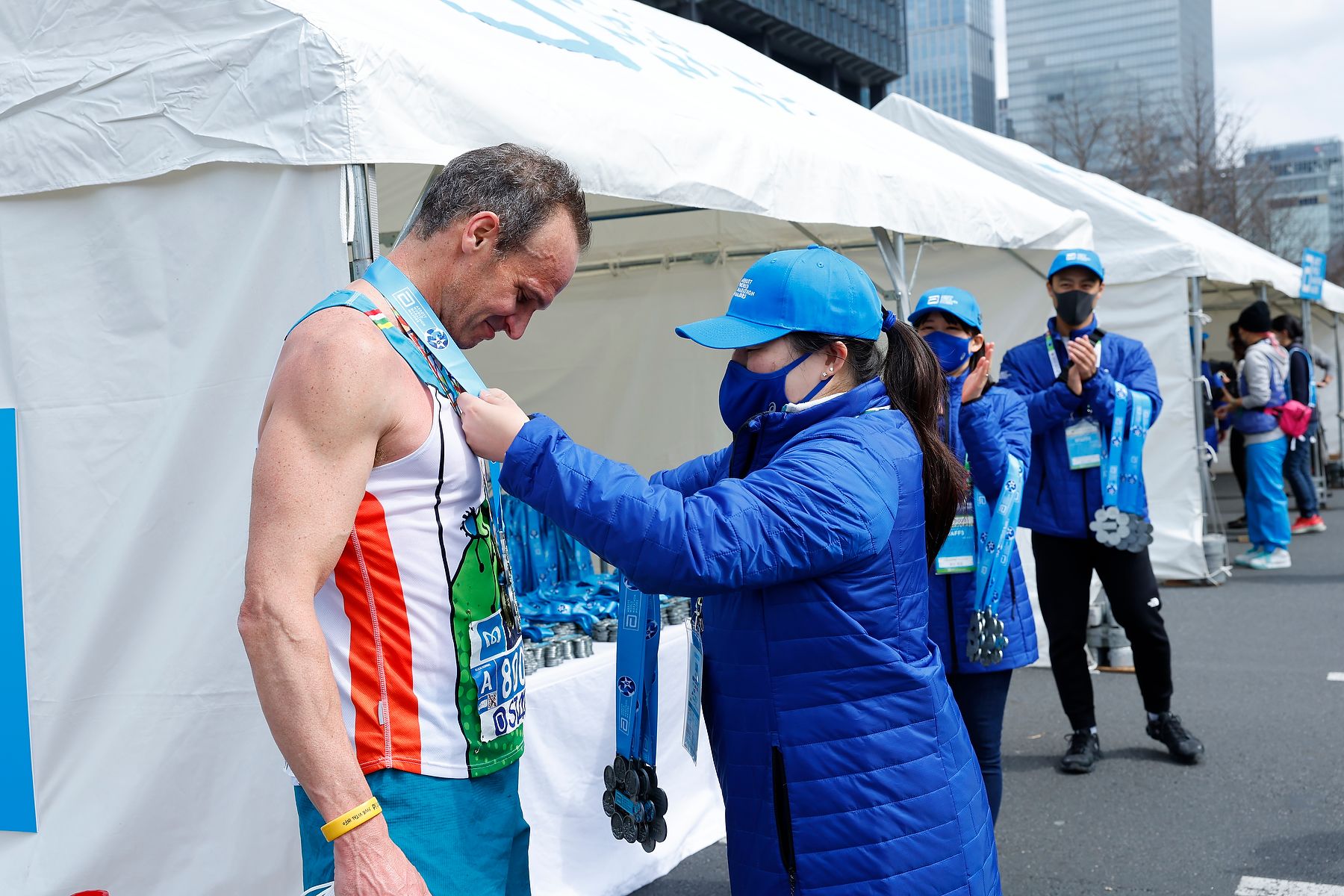
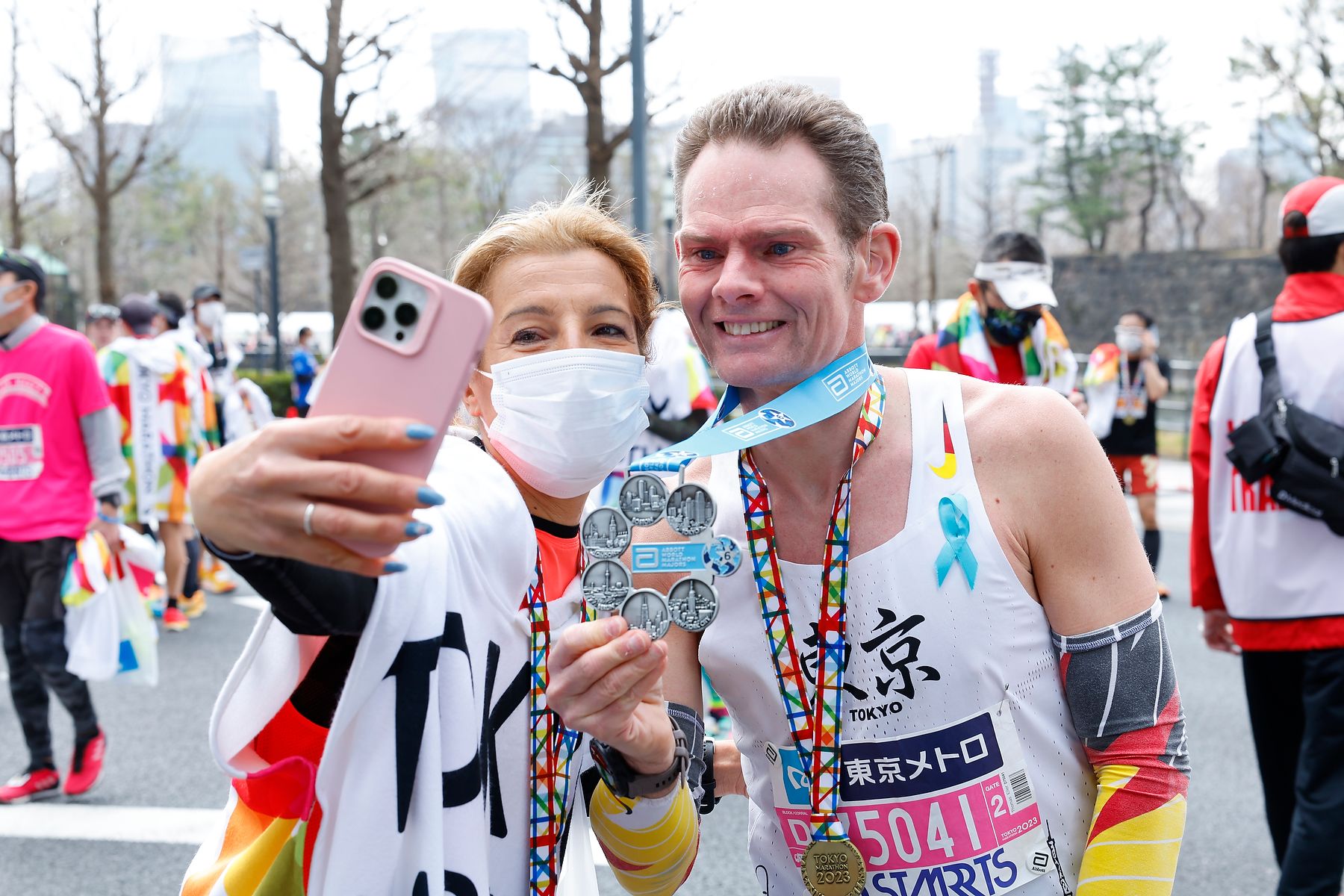







“We typically have a slow trickle of runners and then the masses, but in this case the masses came much earlier than usual and our peak traffic time lasted for almost two hours,” says Judee.
“At that time, it was all hands on deck to get runners identified and get their medals and photos as quickly as possible. There was a moment of panic when the race officials came to me and indicated our line was too long – what could we do?”
Further help was at hand from TCS New York City Race Director Ted Metellus and his counterpart from the BMW BERLIN-MARATHON Mark Milde, along with his colleague Oliver Bach.
“Ted got two lines formed quickly and Mark and Oliver got to work speeding up the photo process,” says Judee. “We had to limit time available for the runners to take selfies as that was slowing down our lines.
“Our volunteer leads made sure their teams were directing runners to the appropriate photo line and managed their personal items for them to reduce the time they had to spend in our tent.
“Ted’s expertise in operations came in more than handy as he kept an eye on what was happening and made adjustments as needed. He went to Stew’s tent when they needed assistance, too.”
With Nick Bitel, the CEO of the London Marathon, Chicago’s chief operating officer Mike Nishi and Mary Kate Shea, the director of professional athletes for the Boston Athletic Association, also busy unboxing more medals and organising runners, the whole operation turned into one big Majors family mission.
As the runners cascaded through the finish, the Six Star count began to tick up with increasing speed.
With the Guinness World Records team in attendance to oversee the number, it quickly became clear to them that the record had been well and truly smashed, and the certificate of achievement was presented by Majors CEO Dawna Stone to Tokyo’s race officials.
One runner, however, was struggling to add to that number.
STRANGERS
TO THE
RESCUE
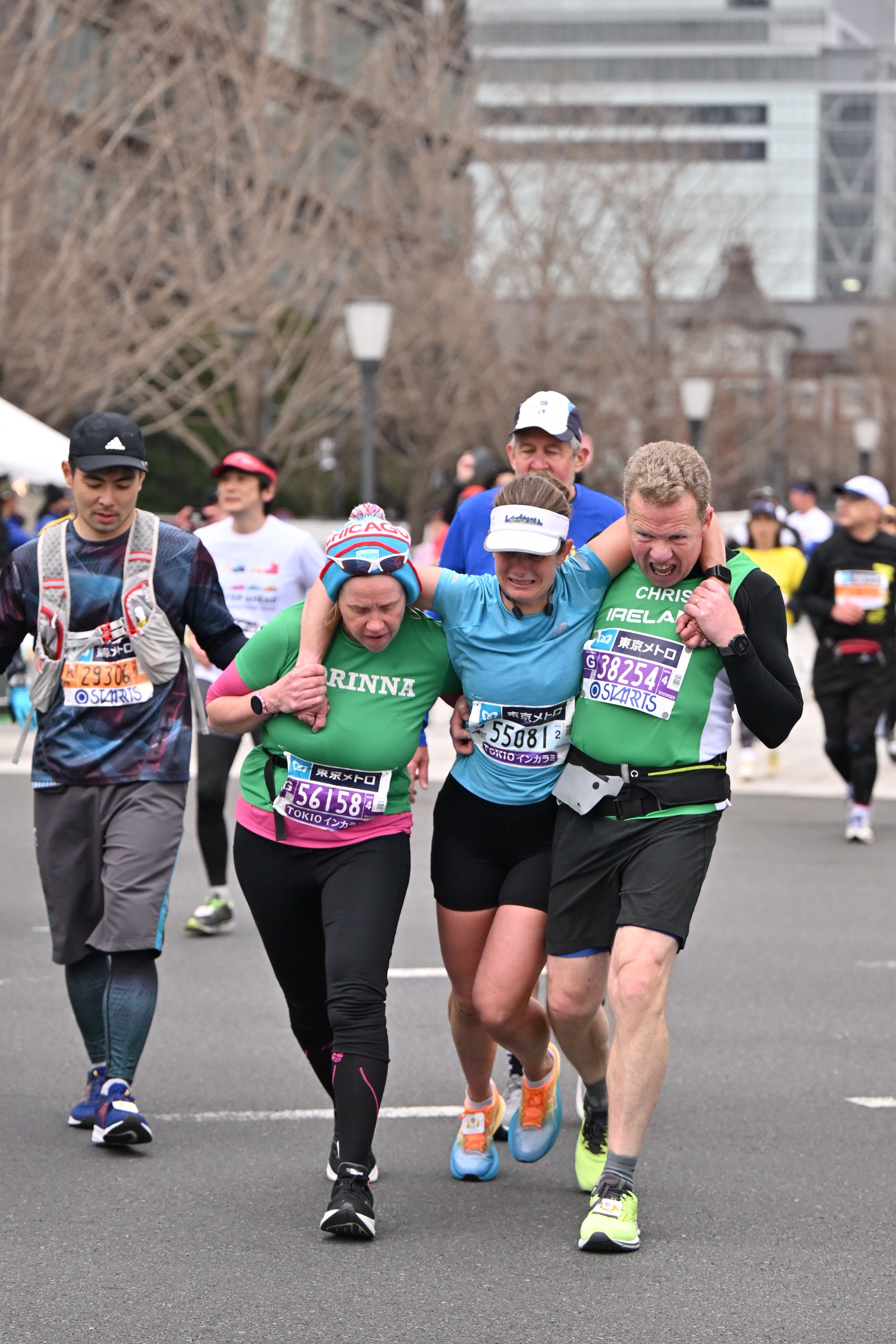
Becky McMorries, a teacher from Nacogdoches, Texas in the USA, knew something was wrong in her left leg before she had even started.
By managing her mileage in the build-up – and with an iron will to get Tokyo completed having waited since earning a place through the lottery in 2019 to run it – she got herself to the start line.
X-Rays had shown nothing, and she was satisfied that the pain which had been moving around from hip to groin to knee was simply a muscle strain.
“I knew that it would hurt and knew I would walk a bit,” she says. “I had even spaced out our trains booked after the race because I knew I’d be moving slowly, but I would have finished, and could take time to recover.”
With pain from the very first step, Becky made it to 13 miles at a decent pace.
“I didn’t want to get swept and I knew the cut-off times were strict. Someone ran by me at mile nine and offered me Ibuprofen. I didn’t realize I looked that bad.”
After 13 miles she decided to run/walk. “I put my music on and ran one song, walked one song. Then at 18 miles, I realized walking hurt more than running, so I started running again, but even the other walkers were passing me. I was doing something funky with my right leg to get my left leg moving.”
“At one point I said ‘I can’t do this, I quit,’ and they said, ‘Fine. If you quit, we’ll quit, then it’s all your fault”
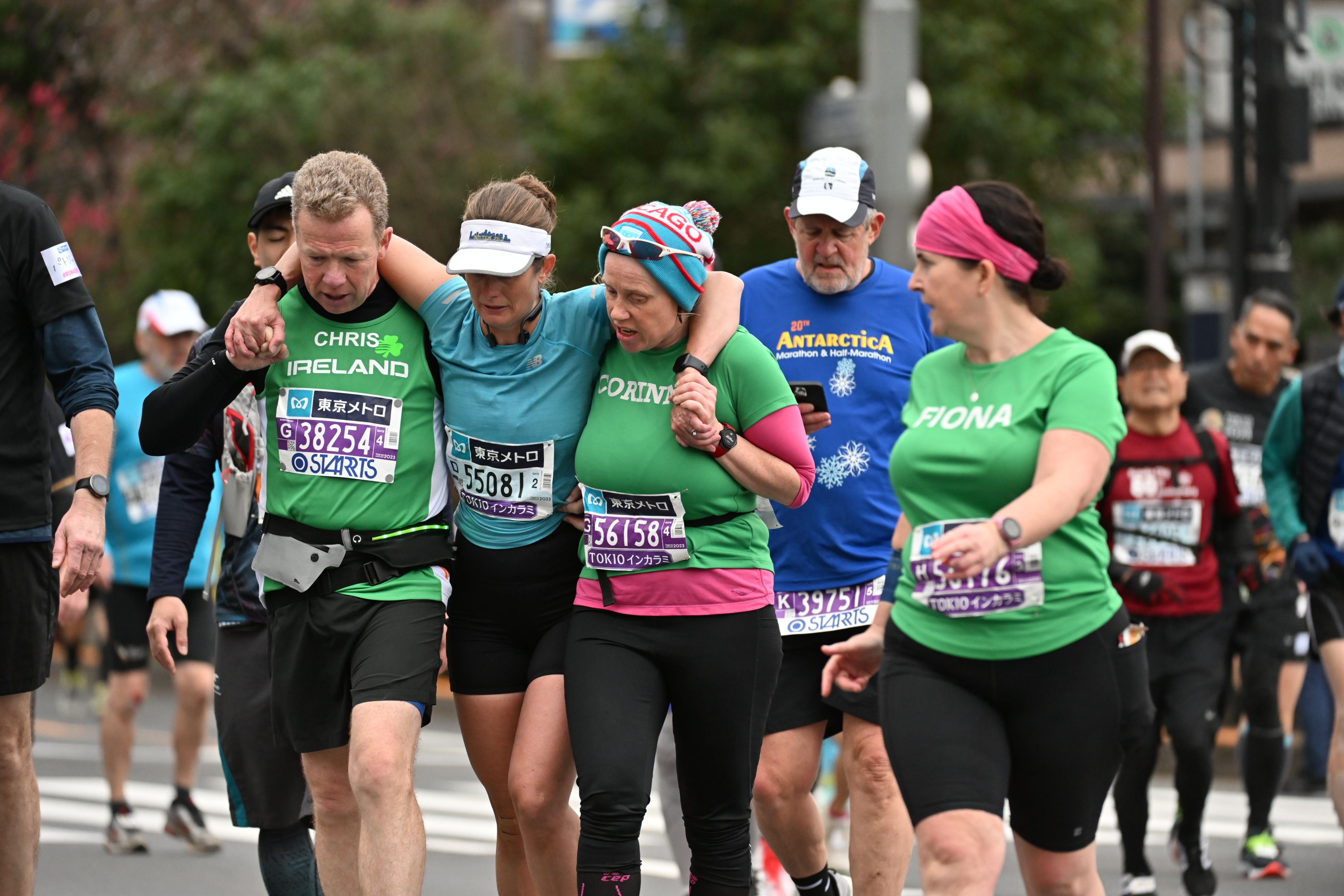
At mile 23, the game was up. Becky stopped.
“When I tried to go again, that’s when it broke, finally.”
What she’s referring to is her left femoral neck – the part of the thigh bone that connects into the hip socket. Later on, it would come to light that she must have started with a stress fracture the X-Ray didn’t catch.
“It (the X-Ray) was too early, it had only been a week since the pain had started. I ran it to a completely displaced fracture and that’s why I couldn’t walk. I could feel a pop.”
After a minute contemplating the premature end of her race, Becky met her new best friends.
“Patrick from Belgium had already befriended me at mile 21,” she says. “He’d said I looked like I needed a friend, saw my Six Star back bib and just walked beside me, no chat.”
Moments later, the Irish arrived. Chris Gibbons, Fiona McGinley and Corrina Gorman, all from Dublin, were all aiming for their Six Star medals too. This would be Chris’s second full set of Majors.
“I could see something was wrong and decided to help,” says Chris. “But Patrick was almost twice my height, so between us it just wasn’t going to work. That’s when Fiona and Corrina turned up.”
“I told them I was done, says Becky. “They said, ‘No, you’re coming with us’. So they took my arms and acted as my crutches. Patrick stayed too and said he would fight off the race officials if they got too close.”
Two more runners joined the team, Dennis from the USA and a Japanese runner who Becky has yet to track down, and they started a shift pattern.
“It was like a joke,” says Chris, “three Irish people, a Belgian, an American and a Japanese chap.”
“They created an efficient system where they would swap in, get my water, count my steps, getting me to 50 or 100,” explains Becky.
“At one point I said ‘I can’t do this, I quit,’ and they said, ‘Fine. If you quit, we’ll quit, then it’s all your fault.’ They carried me for three miles. It’s incredible to think these strangers would help a random runner who couldn’t go any further get her Six Star Medal. I still have trouble understanding that much kindness was given to me.”
“We decided we were going to do this,” says Chris, “We all made the call. If she wasn’t getting it, neither were we.”
Eventually, with the runners around them also joining in the step-counting, they got Becky to the line, and to a wheelchair.
One of the group collected her Tokyo medal for her, but getting to the Six Star tent was going to be a struggle now that she was in the care of the medics.
“I suddenly saw someone running over to me saying that the finish line medical team would not let this lady come to the Six Star tent in a wheelchair,” says Scott.
“I went to see if I could help the cause, but they still would not let her come over.
“So, I told them to wait there for just a bit longer and ran to the Six Star tent so I could grab Stew, a medal, a backdrop and a photographer and we all ran back over to her so that she could have her medal presented and pictures taken with the backdrop, just like any other Six Star Finisher.”
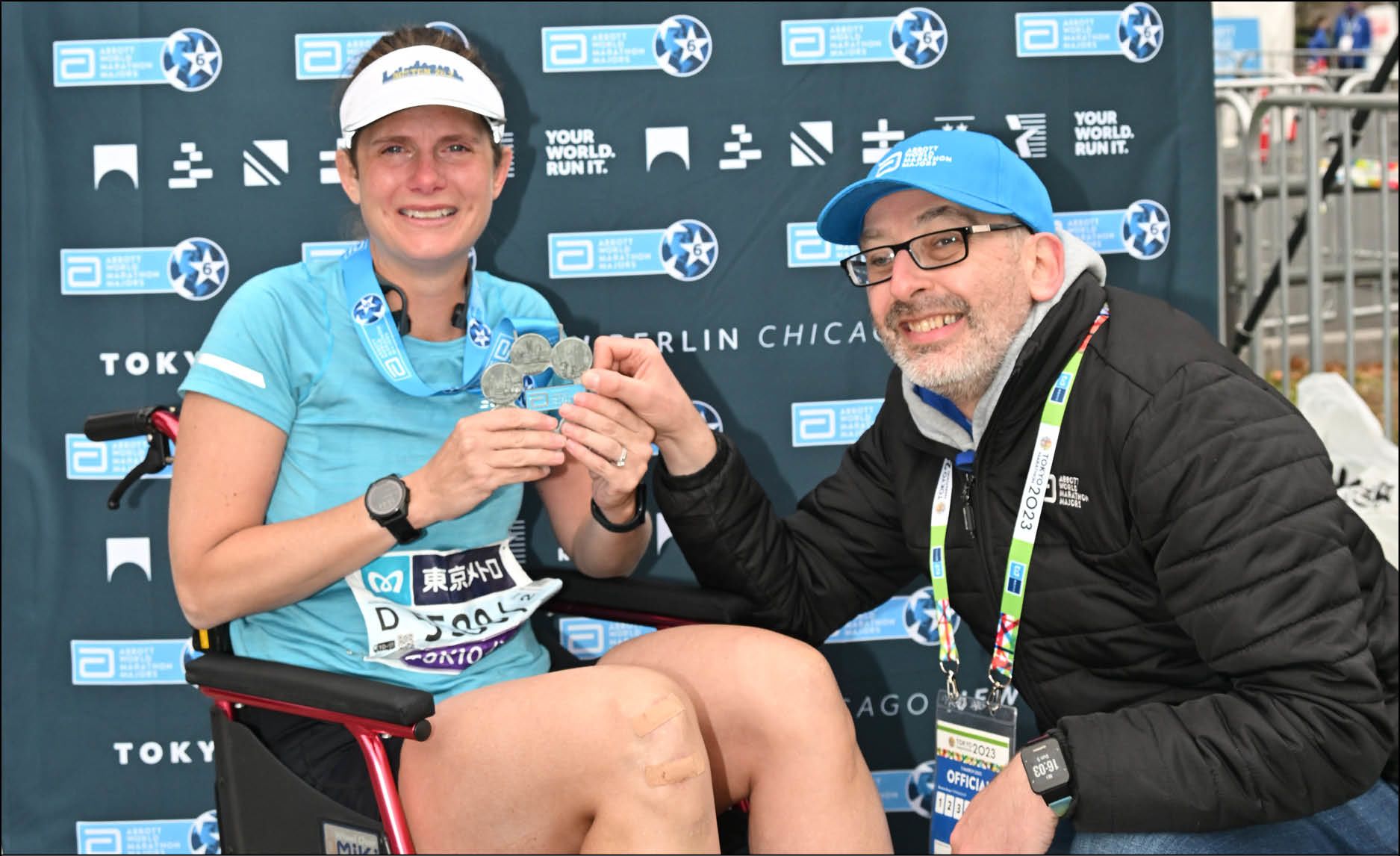
“I can’t move for eight weeks, my muscle is gone, I’m going to have to learn to walk again,” says Becky. “If I had to do all that and I still hadn’t finished Tokyo, it would be a totally different feeling to be going through this, but I did it. If I don’t run for a long time it’s OK, I don’t have this nagging thing in the back of my head.”
On a day loaded with logistical challenges, one last hurdle had been overcome by a team who had pulled off the most significant moment in the history of the Six Star program.
“We had delivered the biggest single day in Six Star history, and in a very successful manner,” says Stew. “Within hours though, I had the familiar post-marathon ‘comedown’, similar to when I’ve run a marathon where you no longer have that big occasion on the horizon.”
“I felt like a 1000lb weight had been lifted,” says Judee. “So much work is required, but it is beyond rewarding to know I’ve played a part in so many Six Star journeys. The rest of the races are going to be a piece of cake!”
For Lorna, it would be her final race as part of the team before moving on to a new role with the Boston Athletic Association.
“It was a race finish like I’ve never experienced before, or will again,” she says. “I cried happy tears most of the day and was so touched that people took the time to recognize the team.
“They were kind and grateful to our volunteers and so happy to be part of the family.”
